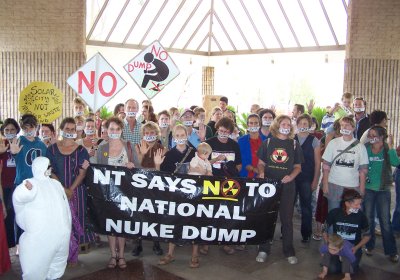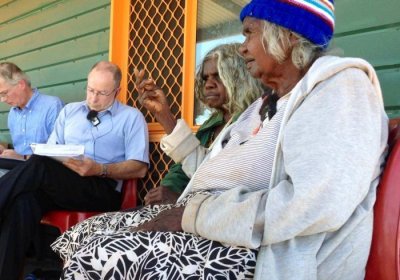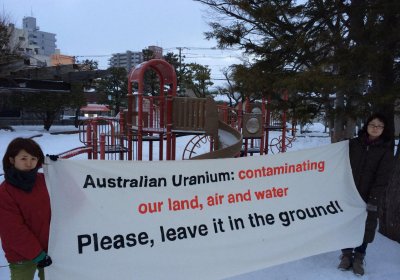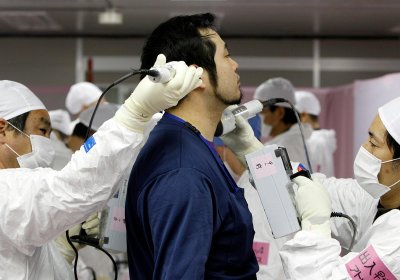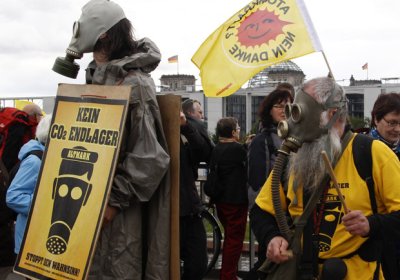Nuclear energy
When Muckaty traditional owners first heard about a proposed waste dump on their land seven years ago, it didn’t seem like such a bad idea.
Many thought it was a general rubbish tip that would recycle, sell reclaimed materials and provide work opportunities for people living in the remote area of the Northern Territory.
Millions of dollars were promised for roads and scholarships. In an area with few employment prospects or education opportunities, it is little wonder the offer seemed attractive.
Seven years after Muckaty Station was nominated as a radioactive waste dump site, a Federal Court challenge has begun in Tennant Creek, 500 kilometres north of Alice Springs and 120 kilometres south of the proposed dump site.
In 2007, the Northern Land Council (NLC) nominated Muckaty to the Commonwealth. The Federal Court challenge is based on the argument that the traditional owners were not properly consulted and they did not give consent.
Beyond Nuclear Initiative released this statement on March 11.
***
On the third anniversary of the continuing Fukushima nuclear crisis, environment groups have called on New South Wales Premier Barry O’Farrell and his government to shelve plans for uranium exploration and mining in the state.
ACF nuclear free campaigner Dave Sweeney said: “It was confirmed to the federal parliament in October 2011 that Australian uranium directly fuelled Fukushima.
The Environment Centre NT released this statement on December 7.
***
Environment groups have called for an immediate halt to operations at the Ranger uranium mine in Kakadu following a major contamination leak.
Around one million litres of highly acidic radioactive slurry has escaped from the mine’s containment area following the collapse of a tank in the processing area early in the morning on December 7.
Nearly 60 years have passed since Totem 1, a British nuclear test in the Australian desert, was recklessly conducted in unfavourable meteorological conditions.
Nuclear testing of any sort, even in the most “controlled” of circumstances, is inherently abusive, a crime against the environment and humanity for countless generations to come. Yet the effects of Totem 1 were particularly bad, even by the warped standards of the era.
Swedish hardcore punks AC4 blast nuclear policy on their new album, Burn the World. Green Left's Mat Ward spoke to frontman Dennis Lyxzén and main songwriter Karl Backman.
For anyone who knows the science, it’s settled — fossil fuels need to be banished fast from our energy mix. But how do we achieve it? Can we rely on renewable sources such as wind and solar? Or must humanity turn to nuclear power?
That’s a controversy that has bubbled away for years among people who all accept the dangers of global warming. Now, from the energy sector in China, there’s hard new evidence bearing on this debate.
The experience in China shows that as a way of quickly replacing greenhouse-polluting fuels, renewable energy wins against nuclear, hands down.
Angry residents from Kemps Creek and surrounding neighbourhoods packed the local sports and bowling club auditorium on February 18 to protest against the state government’s plan to dump radioactive waste in the area.
The NSW Liberal government is proposing to shift 5800 tonnes of soil from an area in Hunters Hill, where a uranium ore processing plant once stood, to the Kemps Creek SITA dump site.
Cancer clusters have been detected in Hunters Hill, which have been linked to the contamination left behind at the former plant site.
March 11 was the first anniversary of the Tohoku earthquake and tsunami in north-east Japan and the meltdowns, explosions and fires at the Fukushima nuclear plant.
The impacts of the nuclear disaster have been horrendous. More than 100,000 people are still homeless and some will never be able to return.
Homeless, jobless, separated from friends and family, the toll on people's health and mental well-being has been significant — one indication being a sharp rise in suicide rates. One farmer’s suicide note simply read: “I wish there wasn’t a nuclear plant.”
The largest anti-nuclear protests in German history were held on March 26. About 250,000 people marched in Germany’s four largest cities.
Under the slogan “Fukushima Warns: Pull the Plug on all Nuclear Power Plants”, more than 120,000 took to the streets of Berlin, 50,000 in Hamburg, 40,000 in Koeln and upward of 40,000 marched in Muenchen.
In state elections held the next day, the German Greens won a historic victory in Baden-Wuerttemberg. They will form Germany’s first-ever Green-led government.
They also tripled their vote in elections in Rheinland-Pfalz.
Germany’s centre-right government is facing what many have dubbed a “hot autumn” of protests, as conflict over a range of social, political and environmental issues come to a head across the country.
As the governments of Europe attempt to offload the costs of the financial crisis onto working people, German Chancellor Angela Merkel has initiated a series of “austerity” measures aimed to undermine Germany’s social welfare system.
- Previous page
- Page 3
- Next page

